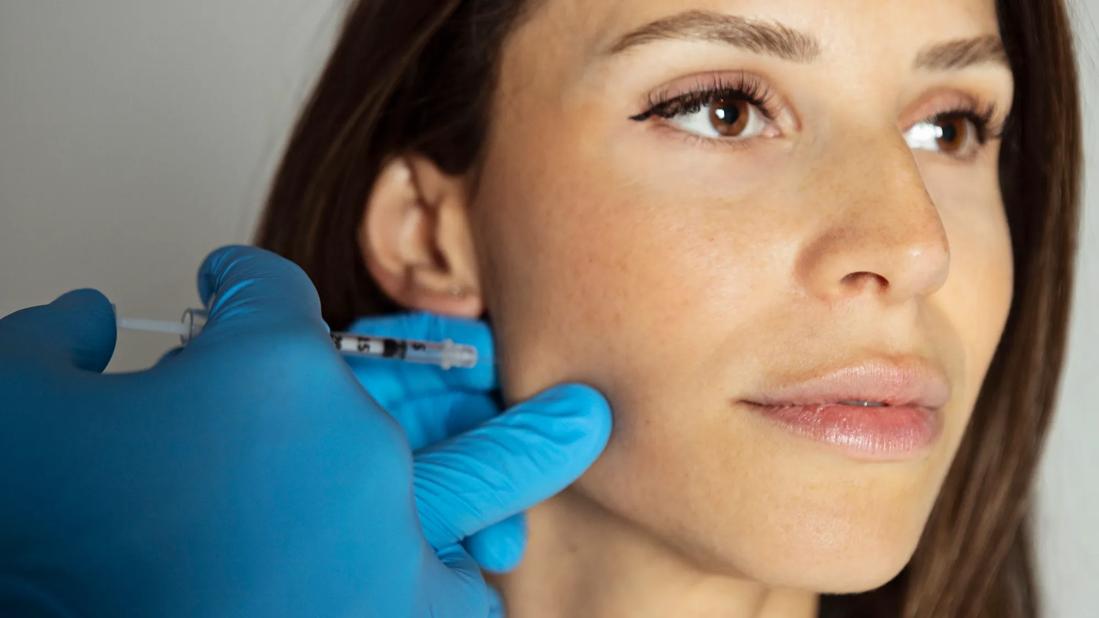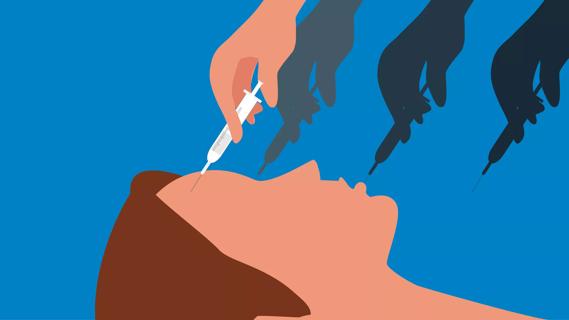Although Botox isn’t an FDA-approved treatment for TMD pain, it’s still considered a good supplemental therapy in some cases

Most people think of Botox® (botulinum toxin) as a wrinkle fighter. A technology to turn back time. But in recent years, it’s become important for treating many medical concerns. And in many cases, those problems — like overactive bladder, migraines and muscle spasticity — are functional, not cosmetic.
Advertisement
Cleveland Clinic is a non-profit academic medical center. Advertising on our site helps support our mission. We do not endorse non-Cleveland Clinic products or services. Policy
In recent years, Botox has become a popular treatment option for people with jaw muscle pain or severe teeth grinding. That includes temporomandibular disorders (TMD), commonly known as TMJ. Confused? TMJ actually stands for “temporomandibular joint.” “TMD” is the term that describes a disorder affecting the joint.
Dentist Karyn Kahn, DDS, explains how Botox helps reduce jaw muscle pain and the risks and benefits of its use.
Botox is a neurotoxin generated by a bacterium called Clostridium botulinum. Botulinum toxins occur naturally in both the soil and contaminated foods. If you consume large amounts of botulinum toxins or the bacteria get into a wound, you can develop a potentially deadly condition called botulism. This serious nervous system disorder affects breathing and can result in muscle paralysis.
Right about now you might be feeling a bit alarmed: Why would anybody want to inject a face with poison?
Healthcare providers use a specific type of the bacteria (Botox type A) for medical injections. Botox is produced in a lab, where it’s diluted and sterilized. That means it’s extremely unlikely for a Botox injection to cause botulism, when prepared and administered correctly. (We’ll come back to this.)
Advertisement
Botulinum toxin works by blocking nerves in the muscles where it’s injected, temporarily reducing contraction. Reducing a muscle’s ability to contract reduces its hyperactivity. After an injection, your jaw and face muscles can’t overwork themselves anymore, which helps break the chronic pain cycle and prevent additional strain on your jaw.
“Botox is a good option for pain management,” Dr. Kahn shares. “But it likely won’t solve the root problem or completely eliminate your chronic pain.” That’s why it’s used as a supplemental therapy to relax strong masseter muscles.
Getting Botox for TMD isn’t quite the same as getting it for cosmetic reasons. It requires even more precision and should be given by an oral surgeon, otolaryngologist (ENT) or an experienced plastic surgeon.
It can take anywhere from a day to a couple of weeks to feel the effects of the injections. Most people who get Botox for TMJ pain find that it lasts for about three or four months. You may need to have it done more frequently if your pain is severe or your jaw muscles are very strong (hypertrophic).
The U.S. Food and Drug Administration (FDA) has not yet approved Botox for use in the treatment of temporomandibular disorders. And research into it has produced mixed results. Some studies suggest it does a better job on some symptoms (like teeth grinding) than others (like pain).
As a result, Dr. Kahn explains that providers usually only try Botox injections when more conservative treatment methods aren’t working or your quality of life is being negatively affected. If you do receive Botox, you’ll likely continue doing physical therapy, splint therapy and taking medications to manage or prevent jaw pain.
The jury’s still out on Botox’s effectiveness, but if it works for you (as it has for many people), you could expect the following symptoms to calm down:
All invasive medical procedures come with risks, and Botox is no exception. While Botox is generally considered safe for adults, you should always have a detailed conversation with your provider to determine if the treatment is safe for you.
The following are side effects that people have experienced:
It’s extremely rare for a therapeutic injection of legitimate Botox to cause botulism. The last recorded case was in 2017. Dr. Kahn urges you to only get injected by a licensed healthcare provider in a medical setting.
Advertisement
“Back-alley Botox” providers often use counterfeit products that aren’t safe. In other cases, they use the toxin incorrectly, with potentially deadly consequences for their clients. It’s a big enough problem that the U.S. Centers for Disease Control and Prevention (CDC) issued an alert about it in April 2024.
Bottom line? Whether or not Botox could help your TMD is TBD. But don’t let the uncertainty dissuade you from speaking to a provider. If your jaw pain is making eating, singing or laughing uncomfortable, you deserve to know your options.
Advertisement
Learn more about our editorial process.
Advertisement

Take a hands-on approach to release tension and reduce pain in your jaw muscles

From posture to massage, these 9 at-home remedies may help ease your jaw pain

TMJ pain can cause headaches, but chiropractic treatments, lifestyle adjustments and medication can help ease discomfort

The soreness could be from the way you sleep, teeth grinding, bite misalignment or other issues

Botox isn’t your best choice during pregnancy — try topical vitamin C and moisturizers in the meantime

This treatment can be an effective way to calm muscle stiffness and spasms from nerve damage

Most recommended precautions center around minimizing bruising or swelling

With repeat injections over time, you may be able to slow the development of new wrinkles

Wearing a scarf, adjusting your outdoor activities and following your asthma treatment plan can help limit breathing problems

Your diet in the weeks, days and hours ahead of your race can power you to the finish line

When someone guilt trips you, they’re using emotionally manipulative behavior to try to get you to act a certain way